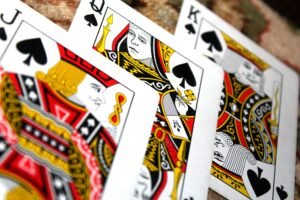Psychology of Gambling
People have gambled for thousands of years, drawn to the thrill of risk and the chance of winning big. The mix of excitement, uncertainty, and potential rewards creates a powerful mental rush that keeps players coming back for more. The human brain releases dopamine during gambling, which triggers the same reward pathways as food, drugs, and other pleasurable activities.
Gambling combines skill and chance in ways that make people feel they have control over random outcomes. When someone wins, their brain remembers the pleasure and excitement. These memories influence future behaviour and can lead to repeated gambling, even when losses pile up.
The casino environment adds to the appeal with bright lights, sounds, and social atmosphere. These elements work together to create an immersive experience that distracts from everyday stress and worries. Free drinks, loyalty programs, and special events make people feel valued and special.

Key Takeaways
- The brain’s reward system releases chemicals that create pleasure and excitement during gambling
- People often overestimate their control and ability to predict gambling outcomes
- Social and environmental factors in casinos strengthen the appeal of gambling activities
The Allure of Gambling
Gambling creates powerful effects in the brain through risk and rewards. These effects combine with the thrill of competition and potential financial gains to create a compelling experience.
Understanding Excitement and Risk
The human brain loves taking risks. When people gamble, their hearts beat faster and their palms get sweaty from pure excitement. This natural response dates back to our earliest ancestors who faced physical risks for survival.
Risk-taking activates multiple areas of the brain linked to pleasure and reward. The uncertainty of each bet creates tension that many find thrilling.
People often describe gambling as giving them a “rush” or “high”. This sensation keeps them coming back to experience those same intense feelings again.

Dopamine and Adrenaline Effects
The brain releases powerful chemicals during gambling activities. Dopamine floods the reward system when people win or even come close to winning.
Adrenaline surges through the body while waiting for results. This creates physical responses like:
- Increased heart rate
- Heightened awareness
- Faster breathing
- Enhanced focus
These natural chemicals can make gambling feel incredibly rewarding. The brain starts to link these good feelings with the gambling experience.
The Concept of Challenge and Winning Money
The possibility of winning money adds an extra layer of excitement. People love the idea of “beating the odds” and proving their skill or luck.
Games of chance present unique challenges that test strategy and decision-making. Players often believe they can develop systems to improve their chances of winning.
The promise of a big payout triggers dreams of wealth and success. Even small wins can feel very rewarding and motivate continued play.
Many gamblers enjoy competing against others or the house. This competitive spirit drives them to keep trying for that next win.
Cognitive Processes in Gambling
The human brain uses specific mental patterns when making gambling decisions. These patterns often lead people to believe they have more control over game outcomes than they actually do.
Illusion of Control and Its Impacts
People who gamble tend to believe they can influence random events through their actions. A poker player might wear their “lucky” shirt or blow on dice before rolling them. They might think their skill level affects purely chance-based games.
Many gamblers create rituals or patterns they think will help them win. They pick specific poker machines or choose lottery numbers based on birthdays or other meaningful dates.
Research shows this false sense of control makes gambling more appealing. When people think they can affect the outcome, they bet more money and take bigger risks.
Cognitive Biases and Faulty Beliefs
The brain creates shortcuts to process information quickly. These shortcuts can lead to mistakes in gambling decisions.
Gamblers often remember their wins more clearly than their losses. This selective memory makes gambling seem more profitable than it really is.
Many people focus too much on near-misses. Getting four out of five matching symbols can feel like “almost winning”, even though it’s still a complete loss.
The hot hand fallacy leads gamblers to believe winning streaks will continue. They might keep betting after a few wins, thinking their luck will hold.

The Gambler’s Fallacy
The gambler’s fallacy is thinking past events affect future random outcomes. For example, if a coin lands on heads five times, many people believe tails is “due” next.
In roulette, players often track which numbers have come up. They bet more on numbers that haven’t appeared recently.
This thinking is wrong because each spin, roll, or deal is independent. Previous results don’t change the odds of future outcomes.
The fallacy leads people to create complex betting systems. They might double their bets after losses, thinking a win must happen soon.
Behavioural Aspects of Gambling
People who gamble often show distinct patterns of behaviour that can affect their decision-making and mental wellbeing. These behaviours range from trying to recover losses to developing problematic habits that impact daily life.
Chasing Losses and Reinforcement
Gamblers often try to win back money they’ve lost through more betting. This behaviour, called chasing losses, can create a dangerous cycle of increased risk-taking.
The brain releases dopamine during gambling activities, especially when winning. This chemical reward makes people feel good and encourages them to keep playing.
Random reward patterns in gambling are particularly effective at reinforcing behaviour. Like rats pressing a lever for food, gamblers never know exactly when they’ll win, which makes the activity more compelling.
Addiction and Problem Gambling
Problem gambling affects about 1% of Australian adults. These people struggle to control their gambling despite negative consequences to their finances and relationships.
Common signs of gambling addiction include:
- Lying about gambling activities
- Borrowing money to gamble
- Missing work or family events to gamble
- Feeling irritable when trying to stop
The brain changes in gambling addiction mirror those seen in drug addiction. Regular gambling can alter brain circuits related to reward and self-control.
Treatment options like cognitive behavioural therapy help people identify gambling triggers and develop healthier coping strategies.
Social and Emotional Dimensions
People gamble for more than just money. The social connections and emotional benefits drive many to keep playing, even when they don’t win.
Social Factors and Camaraderie
Social gambling creates bonds between players at poker tables, betting shops, and casinos. Friends gather to share the excitement of sports betting or playing the pokies together.
The shared experience of winning and losing brings people closer. Players often develop their own rituals and inside jokes, strengthening their social ties.
Many gambling venues design their spaces to encourage social interaction. Circular poker tables, communal betting areas, and celebratory atmospheres make people feel like part of a community.
Emotional Regulation and Escapism
Gambling triggers the release of dopamine, creating feelings of pleasure and excitement. This chemical response helps people temporarily forget their worries and stress.
The intensity of gambling can serve as a distraction from daily problems. Players report feeling more alive and focused during games, pushing aside negative emotions.
Some use gambling to cope with difficult emotions like loneliness or boredom. The bright lights and engaging sounds of gaming machines provide sensory stimulation that lifts their mood.
Regular gamblers often describe the “zone” – a state of complete absorption in the game. This mental escape can become addictive as people seek to recreate these moments of relief.
Near Misses and Loss Aversion
Near misses in gambling trigger a unique response in the brain. When players almost win, their brains release dopamine similar to an actual win, creating a powerful motivational effect that keeps them playing.
Loss aversion makes people feel the pain of losses more strongly than the pleasure of gains. Studies show that losses feel about twice as powerful as wins of the same size, which leads gamblers to chase their losses.
The combination of near misses and loss aversion creates a tricky mental trap. Near misses give players false hope, while loss aversion pushes them to try to win back what they’ve lost.
Brain scans reveal that near misses activate reward pathways even though no money is won. This explains why slot machines and scratch cards often show many “almost won” results to keep players engaged.
Casinos and gaming companies use these psychological effects in their game designs. They program games to show more near misses than would happen by chance, knowing this keeps players gambling longer.
These cognitive biases affect both new and experienced gamblers. Even when people know about these tricks, their brains still respond to near misses and losses in the same way.
Key signs of these biases:
- Feeling excited after almost winning
- Betting more after losses
- Focusing on near wins instead of actual losses
- Believing a win must be coming soon
Promoting Responsible Gambling
Setting clear limits and staying aware of gambling habits helps people enjoy games of chance safely while avoiding harmful behaviours.
Identifying and Mitigating Risk
Problem gambling often starts with small warning signs. People might chase losses, spend more time gambling than planned, or lie about their habits to friends and family.
Setting strict money limits before playing is essential. A gambler should never bet more than they can afford to lose.
Key risk factors include:
- Using gambling to escape stress or problems
- Borrowing money to gamble
- Missing work or social events to gamble
- Feeling restless when trying to cut down
Regular self-assessment helps spot these warning signs early. Many casinos and betting sites offer tools to track spending and time spent gambling.
Strategies for Responsible Play
Smart gamblers treat games as entertainment, not a way to make money. They set both time and money limits before they start.
Practical safety measures:
- Use pre-commitment tools to set spending caps
- Take regular breaks from gambling activities
- Never chase losses
- Keep gambling separate from alcohol use
- Only gamble with disposable income
Many organisations provide free support services. These include counselling, self-exclusion programs, and financial advice.
It’s crucial to maintain other hobbies and interests. A balanced lifestyle reduces the risk of gambling becoming a primary source of excitement.
Frequently Asked Questions
Gambling connects deeply to human psychology through brain chemicals, emotional triggers, and reward patterns. Common questions explore the science behind gambling behaviours and available help options.
What are the underlying psychological reasons for engaging in gambling?
People gamble to experience excitement and the rush of dopamine. The unpredictable nature of wins creates an intermittent reward pattern that keeps players engaged.
The possibility of winning money triggers hope and optimism in gamblers. Many see gambling as an escape from stress or negative emotions.
Social factors play a key role, as gambling often happens in groups. The shared experience creates bonds and feelings of belonging.
How does gambling influence the human brain’s reward system?
The brain releases dopamine when gamblers win or nearly win. This chemical creates feelings of pleasure and motivation to keep playing.
Near-misses activate similar brain regions as actual wins. This tricks the brain into feeling like it almost succeeded, encouraging more attempts.
The reward system becomes less sensitive over time with repeated gambling. Players often need to bet more to feel the same excitement level.

What comparisons can be made between gambling addiction and substance dependencies?
Both gambling and substance addictions affect similar brain circuits. They share common patterns of craving, tolerance, and withdrawal symptoms.
Addicted gamblers show changes in their decision-making abilities. They often struggle with impulse control, like those with drug dependencies.
The recovery process involves similar steps for both types of addiction. Treatment usually combines therapy, support groups, and lifestyle changes.
In what ways can gambling behaviour lead to negative consequences?
Financial problems often start with chasing losses. Gamblers might borrow money or sell possessions to continue betting.
Relationships suffer as trust breaks down due to lying about gambling. Family members feel stressed and anxious about money problems.
Work performance can decline as gambling takes priority. Some people miss work or use work time to gamble online.
What recognised treatments exist for those struggling with gambling addiction?
Cognitive behavioural therapy helps change gambling thoughts and habits. It teaches skills to identify triggers and develop healthier coping methods.
Support groups like Gamblers Anonymous provide peer support. Members share experiences and strategies for maintaining recovery.
Financial counselling helps repair money problems. Counsellors create budgets and debt management plans.
How is happiness linked to the act of gambling according to psychological theories?
Gambling creates short-term happiness through excitement and anticipation. The brain releases feel-good chemicals during these moments.
Risk-taking behaviour links to natural reward systems. Some people feel more alive and engaged when taking calculated risks.
The social aspects of gambling can boost mood temporarily. Playing with friends adds enjoyment and connection to the experience.






